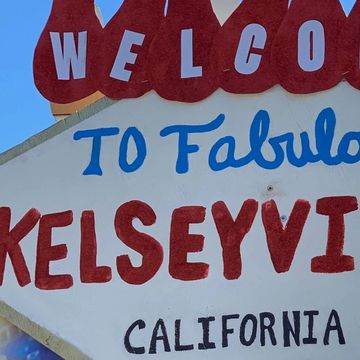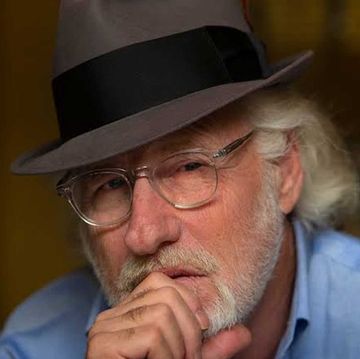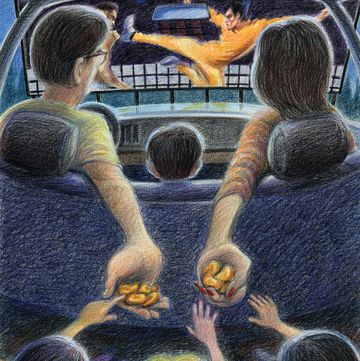On the 24th of November, 2021, Wes Jackson and I conducted three lengthy conversations by telephone. Wes is cofounder of the Land Institute in Salina, Kansas, and he and I have been friends for more than 40 years. We have talked together, face-to-face and on the phone, for hundreds of hours. Our conversation on that day tended toward an understanding, finally realized, that I saw as extraordinarily valuable, and that I tracked on a set of notes. But our conversation was at the same time a social event, consisting of much laughter and several subjects extraneous to everything but amusement. After it was over, I’m sure that neither of us could have outlined the steps of it or remembered who had said what.
To the extent that we were talking in earnest, our subject was the set of calamities that the media and the commentators frequently take up, typically dealing with each one in isolation from the others and representing each as an emergency more or less apocalyptic, in tones recalling a number of vernacular alarms, from “Last chance for beer” to “Prepare to meet God.” We were speaking of climate change, varieties of pollution, pandemic, overpopulation, bad health, species extinction, water shortage, breakage of supply chains, the persistence of racism, and so on, all of which we were taking seriously. This inventory of popular calamities excludes a number of unpopular calamities—for example, soil erosion or pollution of farmland and waterways by agricultural chemicals or destruction of the farm population and rural communities. Other calamities, such as the risk of nuclear war or nuclear mistake and the accumulation of nuclear waste, are old and semipermanent worries, returning to popularity from time to time.
This article appears in Issue 27 of Alta Journal.
SUBSCRIBE
But all these calamities, as we eventually saw, are not properly understandable as problems. Properly understood, they are symptoms of a problem. The problem is industrialism, or its offspring, the industrial economy—which, by using a progression of technologies to increase profits, ignores and transgresses every limit, denies the issue of scale, and discounts every nonmonetary cost. To accept the industrial economy as ordinary or normal is to give up any possibility of controlling or regulating it. It “grows” only by consuming, once for all, the living world. Industrialism, in short, is an anomaly in all of creation, unnatural, inhuman, dehumanizing. Its most characteristic business is industrial war. Its distinguishing sign is waste. Because of industrialism, there are now millions of people who have never known a dark night or heard silence or seen anything beautiful.
Like an organism, the industrial system places a high premium on its own survival. But it is a pseudo-organism, for its intent is to survive uniquely and exclusively. Its survival entails the exclusion, and so finally the destruction, of other systems, including social and natural systems. Here our argument points straight to John Crowe Ransom’s introduction to I’ll Take My Stand: “But a fresh labor-saving device introduced into an industry does not emancipate the laborers in that industry so much as it evicts them.” And: “The remedies proposed by the apologists [for industrialism] are always homeopathic. They expect the evils to disappear when we have bigger and better machines, and more of them.” The proposed remedies are always homeopathic because any standard or remedy exterior to the industrial system would imply a need for limits or restraints on “growth.”
Only the Old Order Amish, so far as I know, have dared collectively to judge industrialism by a standard leading to remedies exterior to it. Their standard, derived from Scripture, is the love that makes people good neighbors to one another. Merely their question “What will this do to our community?” when asked of any technical innovation, has the power to break the hold of technological determinism. It does so by putting the community under the authority of love and thus in charge of its own life. This can happen only because the interest of the community places a limit on the wants and wishes of its members individually, and this is a limit that the members must accept. Such an acceptance could not be more at odds with the industrial program, which sets no limits and thus in effect puts the self-seeking individual into competition with the community, and with every other self-seeking individual. The self-seeking individual is a diseased person who becomes a disease of the community.
Such talk of course will invite the aforesaid apologists to advise that “we can’t turn back the clock,” which is nonsense. Our subject here is health, not time. And homeopathy, Ransom’s metaphor, is appropriate. The unhealthy have left health behind. We don’t ask alcoholics to become sober by drinking more liquor. We ask them to return to the health of sobriety. The perception that the industrial revolution is fundamentally flawed does not imply turning back the clock or any other impossibility. It implies, instead, the need for an established, ongoing criticism of the works and plans of industry, using as standards of judgment the health of natural ecosystems and the health, always implying love, of human communities. Such a criticism—long in use on the agrarian and traditional margins of the industrial world—would reveal, for example, the error of replacing the ancient laws of local adaptation and local self-sustenance with a global economy that plunders the world. It would reveal also that a number of laws—nature’s law against waste, for example, and the human law requiring love both for one’s neighbors and for one’s enemies—are not optional, as we seem to have thought, but are to be obeyed absolutely, if we humans wish to survive.
By any external standard that Wes and I know, the industrial experiment has been an error from the start, and it is by now undeniably a failure. Our thoughts had led us near to so flat a statement many times, but we had not yet spoken it. We had not yet said that so many of our great problems are in truth symptoms of the one greater problem—the originator and common denominator of them all. Once said, this is obvious. But to say it is clarifying and also a relief. It allows us to climb out of the grave we have been digging for ourselves and to go back to work in the light and air, in the company of friends and neighbors both dead and living. It gives thinking a fresh start and greater scope. It allows judgment to be both precise and complete.
Further thought, as the basis of a criticism comprehensive enough, could start from love, as the Old Order Amish have done and still do. Or it could begin with health, a thought only somewhat more secular. Either or both would provide a standpoint and a standard of judgment external to the system and purpose of industrialism. Both love and health are anti-industrial principles. The industrial mind cannot conceive of either, just as it cannot conceive of the given or recovered wholeness implied by both. It can conceive only of its unresting need to do more of what it has already done—driven by fear, not of dissolution and exhaustion but of death, the death it deals in and its own death.
I sent the first of my notes to several friends to solicit their opinions and suggestions. The essayist and novelist Scott Sanders called me up and, among much else of value, reminded me that both rural and urban communities have been destroyed by industrialism. Of course he is right. If the destruction of rural communities is an unpopular calamity, so is the destruction of urban communities. The old community centers, which necessarily were also economic centers, rural and urban, went down together and for the same reasons: handy personal transportation (the automobile), volume discounts first at mail-order stores like Sears, Roebuck and then at chain stores, and the uniformation of public consciousness by way of the electronic media and advertising—all of which have depended on allegedly cheap energy. The whole enterprise of community destruction has depended also on government approval and cooperation. There has been no legal recognition of the worth of communities and no legal restraint on the economic means of community destruction.
Fossil energy has been accounted as cheap by discounting its real costs to land and people. Energy gathered from sunlight and wind has been recommended by environmentalists as “free.” But the technological collection and storage of this supposedly free energy converts it into one more ugly, soiled, and falsely cheapened natural resource to be exploited by the industrial economy. The current project of placing solar panels on the best farmland, I suspect and hope, is the death spasm of the industrial project of cheap energy—which, when all the costs are added up, has never been cheap and never can be. The only cheap collection of solar energy will continue to be done, beautifully, by plants.
Industry’s always-pressing need for cheap energy, cheap food, and cheap raw materials—cheap to industry, expensive to the living world—required a new pseudo-religion that spiritualized, sentimentalized, and in effect vaporized the economic life of households and communities both rural and urban. The industrial economy required a form of human life that could be only public—organizational, institutional, and commercial—and thus free of intervening economic and cultural forms. Those forms were old, traditional, and, to a significant degree, independent and self-sustaining. I mean the forms of home life and community life. People who had been neighbors and members one of another (Romans 12:5 and Ephesians 4:25), self-employed in a variety of necessary vocations, were to become employees and consumers, living and dying by purchase. The ordering of lives according to place, time, local limits, and opportunities was to be replaced by a long-distance economy.
The primary effort of the industrial economy, wherever it has gone, has been to disparage, degrade, and eliminate the subsistence economies, any form of self-employment, anything at all that people can do freely, independently, using their own abilities and the local means, to help themselves. For example, the industrial solution to “the hunger problem,” by now conventional and thought-free, is to give the hungry people money with which to buy food or to give them “jobs,” forms of industrial subservience, by which to earn money to buy food. The hunger of the hungry thus removes from them any choice but to become dependent entirely on money, like just about everybody else. The idea of reviving the traditional means (natural and cultural) by which people could grow and prepare food for themselves is regarded as heresy.
What has caused this degeneration of households and communities from a customary, reasonable, and practical degree of economic independence and self-help into a state of total dependence on purchases from industrial suppliers? I am sure that different people would respond to that question in different ways. Some, no doubt, would deny that this transformation has been at all degenerative and would classify it as progress, under the heading of “labor saving” or “convenience.” But from the standpoint of health, we must see it as degeneration and decadence. Among its major causes is the dependence, fairly recent but now almost universal, of marriages and households on the employment of both spouses away from home in order to meet or increase their “standard of living”—and their dependence in turn on increased outlays of money for vehicles, clothing, processed food, eating out, childcare, and so forth. This increase of employment supposedly produces an increase in wealth, yet many thousands of families are described as “living from paycheck to paycheck,” without savings or the ability to raise funds in an emergency. To have no savings is at least better than to be in debt, but too many of our people are seriously in debt. This “lifestyle” is supported by the now-conventional assumption that, for both husbands and wives, work at home is confining and stunting, whereas a “job” is dignified and liberating. This does not, because it cannot, conduce to the stability of families, but it serves directly the insatiable need of an economy dependent on spending.
And so we come to one of the most perfect achievements of industrial genius: an economic trap baited with the promise of personal freedom from the demands of family, household, and community. This depends on illusion, and it will work only as long as illusion passes persuasively for reality. When the actual limits of earth, water, and air start to raise the costs of everything for consumers, when supply chains no longer dependably bring supplies, when the real need of family members and neighbors for one another can no longer be denied or delayed, then will come a new engagement between human beings and the world outside their minds. This will be a large surprise, sternly demanding, possibly rewarding.
I believe I have described pretty accurately our condition as a large nation that for three-quarters of a century has founded its life on unlimited wants and, so far, on enough money in enough pockets for the purchase of falsely cheapened goods—a nation uprooted from the finite earth that it is progressively destroying for the sake of infinite economic growth and without an authentic standard of judgment. This is not the condition of some but not others. It is our common condition. Those of us who regret and fear it are in it the same as everybody else.
Normally, I suppose, people who share a trying condition might come to some sense of mutuality or commonality, as it seems to me we mostly did during World War II. We ought now to be recovering some sense of our shared nature, fate, and responsibility as human beings and inhabitants of the earth. But our present common condition, instead, has left us not so much divided as scattered. As it is founded on illusion, it fosters illusions. The shoddiest illusion, already obvious, is the idea that we can live not only independently of one another but also in opposition to one another, captive consumers making an ideal and goal of individual autonomy.
This boast of absolute individualism surely originates in the industrial ideal of labor-saving, which appears to originate in turn in what seems to me—as also to some Bible scholars, such as my friend Paul House—the most questionable part of the biblical creation story: the idea (Genesis 3:17–19) that our need to work for a living is a punishment. Transposed to the industrial age, this gives us a new cosmic hero, Labor Saver, who in the role of Christ will cancel the Fall and by “miracles of technology” restore us to Paradise. But labor-saving brings into view another punishment that is already at hand: loneliness. People who don’t work don’t work together, don’t need one another’s help, don’t need one another. But then they find that they do need one another. They want to be loved. The evidence is inescapable and, if you have a heart, heartbreaking.
At a time of such extreme and fearful fragmentation, it is amazing to see the interstate highway system listed as an example of the great things that “we” accomplished in better times. That thought itself makes or reveals a division, this one between professional people in affluent urban areas and less-favored people elsewhere. For those “limited access” highways are the most devastating instruments of division and disintegration ever imposed on rural communities as well as on the poorer urban communities. They came uninvited, and they were mostly unneeded until after they had destroyed the rail-passenger service and increased our dependence on long-distance supply chains.
The interstate highways are where we most numerously experience our modernized separateness. Traveling them, we are encapsulated, singly or in twos or threes or fours, in our speeding vehicles among countless others likewise sealed in and in a hurry, by whom we are endangered and whom we never see. Those great roads, which supposedly connect us, are the loneliest places I know.
Another friend who responded to my sheaf of notes was the biologist Robert B. Weeden, who confirmed the obviousness of the perception that Wes and I had come to on our busy day in November: “Industrialism carried its own doom with it from conception.… It had to carry civilization all by itself. Answering every setback with ‘more,’ it ensured that its final collapse will be violent—which we witness daily. The bigger they come, the harder they fall.”
He also agreed to the relevance of our best available living example: “Bringing up the question asked by Old Order Amish—What will this do to our community?—puts the somewhat ideological issue squarely into the realm of experience and opens the door to positive action, which is simply to advocate that all communities ask the [Amish] question.”
And in his series of comments, all of them useful, Bob included a necessary precaution: “You might add that industrialization has infected democracies, socialistic governments, dictatorships, and communistic nations alike.” I agree. That is why we must speak of the economic phenomenon, industrialism, rather than one or another political system. For many years, it has been fairly customary for people disillusioned by capitalism to ricochet into communism, as if the two were opposite. But both put their faith in industrialism, and they subscribe equally to its principles and standards, disagreeing only about who gets the money. Both regard the land and the people as expendable in support of economic goals or plans. Those of us who think of democracy as a political ideal will have to recognize that there is nothing democratic about industrialism. Typically, it gathers the commonwealth into fewer and fewer pockets. Economic democracy in theory is as feckless as any other possibility in theory, but in its examples it is a strong force. If we look for an ism opposite to industrialism, we will find it in agrarianism—of which the best living examples, again, would be among the Old Order Amish.
Bob Weeden reminded me that in history as in the natural world, nothing happens without a cause, and so “industrialism is itself a symptom of earlier and deeper historical shifts.” As a source, he named the Enlightenment: “The domain of belief shrank, and the domain of analysis and fact grew; meanwhile, we came to believe we are separate from and superior to nature.”
Another friend, the geneticist Charlie Sing, pushed the line of causation back to animal origins: “Some have suggested that this history of negative effects began when life acquired cognition.… As Wes is known to say, the predisposition for creating the problems we have is in the meat. I don’t believe that we can hope to solve any of the problems you enumerate without acknowledging this reality.” This certainly is a reality that we now have to acknowledge. And Charlie asked a question that pretty neatly defines our problem: “What is it about humans that renders us so susceptible to the false promises of industrialization and, most recently, to computerization of the very faulty cognitive abilities that are responsible for our situation?” We could answer, and I suspect Charlie would agree, that this susceptibility comes from our irrepressible inventiveness. But once we have cast aside our traditional loyalties and duties, limits and restraints, our inventiveness readily devolves into gratuitous mischief-making, like the acquisitive instinct in pack rats.
Charlie assumes that the power of cognition came to us a large number of years ago by way of evolution. Others, as we know, would say that cognition was simply a part of the package we became on Creation’s sixth day. For my purposes here, the when and how of it don’t matter. What matters is that when cognition came into the world, choice came with it, and with choice came the possibility of choosing wrong over right. I am unsure how far down the scale of creatures cognition and choice may go. I have seen squirrels fall out of trees, and so I know that some animals can calculate and therefore can miscalculate, and I am sure that when they miscalculate, they are as well aware of it as I would be in their place. But because we humans have so great a power of cognition—are so smart—our ability to miscalculate is vast in comparison with that of other animals. We have the ability to choose wrong, not just for ourselves individually as in climbing a tree or a ladder, but to include other humans and other creatures, by now all other creatures, in the wrongness of our choices.
And so another reality that needs to be acknowledged is the doubleness of human nature. The choices available to non-human animals, and the consequences of their choices, are narrowly limited, whereas the choices available to humans, though limited and often limited by humans themselves, are numerous, and some of the consequences have grown to be limitless. Though humans have partly the nature of animals, they also have a nature that is uniquely godlike, fearfully and wonderfully so. If they are capable of instinctive behavior, like the animals, and moreover, unlike the animals, of instinctive behavior grown perverse and monstrous, they are also capable of behavior that is, in the best sense, human or, as we say, humane: magnanimous, self-denying, compassionate, kind.
Humans thus, for better or worse, have a nature that is instinctive and also a nature that is moral. The life they live in the world they inhabit is a life of choices that are starkly opposite, between right and wrong, good and evil. The traditional moral structure of human life was based on the polarity of sin and virtue. Though now disfavored and largely forgotten, that structure is indispensable to any effort of authentic problem-solving that we may wish to undertake. It gives us an equipment of ways and motives that intelligent people have thought about with care for a long time. It notifies humans that they are by nature capable of choosing between good and evil and, moreover, that they are expected to choose what is good. In what I assume is its best-known version, this old structure weighs seven virtues (justice, prudence, fortitude, temperance, faith, hope, charity) against seven deadly sins (anger, covetousness, envy, gluttony, lust, pride, sloth).
I have brought the idea of sin into this essay, aware that by doing so I increase its difficulty, with the hope of enlarging the sense I am trying to make. It completes, for instance, the thought of loneliness. Most simply, sin is understood as lawbreaking. Granting, as we must, the persistent human possibility of bad laws, we don’t have to think much further before we see the portent of breaking a law so apparently trivial as fair play in a game. To break even that law divides the lawbreaker absolutely from the other players. Lawbreaking, whatever may be gained by it, entails the immediate consequence of singularity. Before breaking a law, the lawbreaker implicitly consents to the penalty of loneliness. Sin is opposite, and opposed, to relationship. To break the laws of God risks a loneliness that is absolute, a kind of hell. A lot of people now who would not acknowledge a law-giving deity will say that by breaking the laws of nature—by wasting the land, for example, or by poisoning the water—we invite the same terrible isolation of ourselves from one another and from all the other inhabitants of the living world. Creatures live and thrive by obedience to the laws of nature, or their species do. Disobedience brings extinction. Some, of whom I am one, would understand the laws of nature, by which the world coheres and survives, as laws of God.
It is of course remarkable and not to be denied that industrialism is a malignancy grown from ancient roots. It adheres, Edward Abbey said, to the ideology of the cancer cell. And so it is also remarkable and undeniable that industrialism exactly inverts the ancient moral structure, siding practically and openly with sin against virtue. For evidence of this, we need only to notice how steadfastly its advertisements appeal to anger, covetousness, envy, gluttony, lust, pride, and sloth. Or we could arrive at the same proof by imagining the results should our present economy become dependent on advertisements appealing only to justice, prudence, fortitude, temperance, faith, hope, and charity.
The virtues—the seven I listed and others—cannot thrive when the domain of fact and analysis so far exceeds the domain of belief and when, by a cruel coincidence, the virtues also happen to be bad for business. Even so, there is evidence that the idea of “doing the right thing” still lives among us and can be appealed to. In some consciences—seeded mainly, I suspect, in the industrial world’s agrarian fringe—nature still holds a precedence over contrivance, mystery over analysis and fact, generosity over greed, neighborliness over envy and competition, love over hate, anger, and revenge. Even the scattered movements against scattered calamities appear to rise out of vestiges of the old-fashioned wish to be virtuous or to do what is right. The problem is only that they are incomplete. They appear to be motivated almost entirely by fear, and they do not recognize the interconnections among the several evils that they severally oppose, much less the singular magnitude of the economic error that by now has involved every one of us in the destruction of the world.
A multitude of self-denominated moral perfectionists are now demonstrating and protesting to change the world or save the world, or to cause the people in power to do so, but they wish this to be done for them in a way that will not require them to change their lives or their lifestyles. This wish depends on the belief that substantive change can be made in public but not in private, in the streets but not at home, through technological innovation but not through self-denial or rationing. And it carries forward the superstition, native to industrialism, that Ransom called homeopathy: the belief that people, if highly educated and paid, can manipulate an evil until it becomes a good. But in so transferring the power to choose between good and evil to experts and governments, humans render themselves half-human. Our great damage began, and it persists, in the willingness of people to become fragments, merely the subservants and consumers of industrial products.
We in America have come into this condition of nearly perfect, nearly universal industrialism in remarkable haste. In the rural parts of our country, the change has taken place almost entirely in the years since World War II. In order to save labor and to free ourselves of the burdens of personal responsibility and moral choice, we have entered into a kind of bondage, a kind of half-life. There certainly is something to be said in favor of coming together in public places to beg for or demand political solutions to problems that are political. But the world, including our lives and our problems, will always be larger than politics and best kept as far as possible from the oversimplifications of politics. Still, we have to ask: How can half-humans see our whole problem, or confront it, or deal with it?
We should not allow ourselves to be left with nothing to help us but politicians, the Big Brains of scientists and technicians, and our worn-out history of mechanical cleverness. Our life in this world asks all of us unremittingly for the good use of our own minds. We are called on to employ constantly our ability to choose good over evil. For that, we must begin again the effort to make ourselves whole. Only then, if our great problem can be solved, will we see how to begin to solve it.
This is commonly perceived as a time of big problems that can be solved only by big solutions. The solutions, it is thought, will be big enough only if they are global, political, specialized, and costly. If the smartest people in the biggest universities and corporations are given enough money, they will make the scientific-industrial breakthroughs that will save the world.
I belong to what I suppose is the opposite school. I am, as I said, all for political solutions to political problems, and in a world so populous and so urban, I see no escape from politics. But our problem, we must remember, is that we are destroying the world with the industrial way of life that all of us are living. A good way of life would be, to begin with, a good economy. A good economy starts at home with the economy of the household, but that economy must include and be included in the economy of the community, which can never be entirely separate from the economies of other communities. I am using the word “community” not as a metaphor but rather to designate an actual place with its human and natural inhabitants. A good economy would make the best use of the world’s goods to take the best care of all its members. It would waste nothing and abuse nothing. The wholeness of the members and the membership would be first of all an economic wholeness. It would be health.
If the insight produced by Wes’s and my conversation is worth the trouble of this essay, that is for several reasons, among them these:
It leads us to see our current set of calamities not as isolated and anomalous failures of an otherwise good or tolerable economy, but instead as interconnected and derived from a single cause, which is our bad economy.
It defines the cause not as external to our lives but instead as arising from our common condition, of which we are at once abettors and victims.
It requires us to see that the problem cannot be solved merely by money, technology, politics, and continued violence to the natural world; it can be solved completely and lastingly only by adapting our ways of life to the natural and economic limits of the places where we live.
It removes the problem and the solution from ideology. The problem cannot be solved by a liberal or a conservative victory in an election or (as some appear to wish) by a civil war.
It returns the problem, in rightful part, to the people individually, to whom in part it rightly belongs and without whose willingness to work better and live better, technical and political solutions are hopeless.
By defining the problem as personal and local as well as public and global, it returns human work to the moral circumstances and appropriate scale of human neighborhoods and local ecosystems.
And so it removes the moral emphasis from policy and places it on the ways of life that determine policy. And so it withdraws the expectation of moral responsibility from institutions and directs it to personal economy, conduct, and character, where it belongs. And so it delivers subjugated persons from the determinism of industrial progress and returns them to the responsible vocations of membership and citizenship. It sets them free.•
Wendell Berry’s latest books are The Need to Be Whole: Patriotism and the History of Prejudice and How It Went: Thirteen More Stories of the Port William Membership. He was a Stegner Fellow in the creative writing program at Stanford University in 1958–59; his classmates included Ken Kesey and Ernest J. Gaines. Berry lives in Kentucky and was awarded a National Humanities Medal in 2010.
















